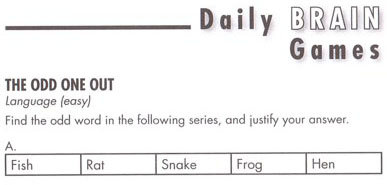This is my third Patch Wednesday post where I discuss a question about video games that I think is unanswered, unexplored, or simply not posed yet. I will propose my own tentative ideas, and invite comments.
The header does sound a bit like Ash Wednesday, so we can reaffirm our faith in the idea of examining video games, but I also call it Patch Wednesday to mark the sometimes ragtag and improvised character of video game studies. It falls mostly on the day after Microsoft’s monthly Patch Tuesday. Time to patch things up and start again.
I think it by now is well understood that players approach a new game on the basis of their previous game (and other) experiences – hence the success of casual games that can be approached by a new audience. And we understand that players during a game will expand their skill set gradually (what I call repertoire in Half-real).
OK, but can we extend this outside regular game-play?
I thought of this when last year, Richard Bartle posted this brain teaser from the “Daily Brain Games” calendar:

What is the right answer? Bartle proposed the following:
- Fish Only one with fins. Only one without lungs.
- Rat Only one with fur. Only one that has babies. Only one that carries the Black Death. Only one that Pied Piper can charm.
- Snake Only one that sheds its skin. Only one able to eat something bigger than its head. Only one Indiana Jones is scared of.
- Frog Only one without a tail. Only one to undergo metamorphosis. Only one that can jump.
- Hen Only one with feathers. Only one with a beak. Only one that can’t live in water. Only one that’s only female.
The calendar wants us to answer rat, because it is a mammal. I have posed this riddle to several people who can instantly identify the correct answer, while I struggled to choose between all the possible explanations I could come up with. I couldn’t figure out why at first, but I suspect that we can identify a number of genre conventions that govern how you are meant to approach such puzzles. For anything related to the natural world, I think there is a hierarchy where you are supposed to answer according to the first distinction applicable:
1) Natural / man-made
2) Fly / walk two legs / walk four legs / swim
3) Mammals / non-mammals
4) Nocturnal / diurnal
5) Cold-blooded / warm-blooded
… 23) Shed skin … 26) Extinction status … 48) Funny observations about the spelling … and so on.
So the trick is to approach a question like this not as logic, but as “what are the usual answers in this genre”.
IQ Tests and Probability
I find that the word and visual puzzles in IQ test often have a similar quality: it is easy to conjure up dozens of possible answers and explanations (like this one), but the test creators seem to believe that there really is one true answer. And again, it comes down to a set of genre conventions that have built over the years.
Another example concerns the kind of puzzles posed to show that humans have a poor grasp of probability or logic. I discussed the Tuesday boy problem some time ago, but let us take the simpler Boy or girl paradox.
- Mr. Smith has two children. At least one of them is a boy. What is the probability that both children are boys?
If you are into probability puzzles, you assume that there is something particular to look out for in the phrasing of the question, and yes: you understand that the question concerns the likelihood that someone who has two children and more than zero boys, will have two boys. The correct answer is 1/3. (Because there are three boy/girl combinations with more than zero boys: boy/girl, girl/boy, boy/boy, and only one of these is boy/boy, so the answer is 1/3.)
If you are not into probability puzzles, you imagine a situation where you meet someone with one of their children, a boy, and you are asked about the likelihood that the other child is also a boy, so 1/2. This certainly isn’t the answer you are meant to give.
It is undoubtedly true that we often apply too-simple heuristics to problems like this, but it is also clear that Boy or Girl Paradox may be more of a test of whether we are into probability puzzles than of whether we intuitively understand probability.
Compare this to the Monty Hall problem, which does not seem to be based on genre knowledge, but actual questions of probability.
I don’t mean to suggest that everything is a game, only that IQ tests and some probability puzzles are too much like stale and ossified game genres to actually measure that they are meant to measure.
As for game studies, I think this shows how the tools that we have developed for game design and game play – these tools can become useful outside regular games.

Very odd that mammal is treated a class above others. (Each other animal is in a different biological class, so in this example, ‘mammal’ is not odd at all). Mammalian exceptionalism?
But the question asks for the odd word in the series, not the odd animal.
That suggests a philological difference, rather than a biological one.
So the answer could very plausibly be “Snake” (the only word in the series containing two vowels, the only word ending in a vowel, the only word with a ‘long’ vowel sound… etc.).
I agree, definitely mammalian exceptionalism. Good point about the word, but I think it’s all just a genre convention that the people who made the puzzle aren’t even conscious of.